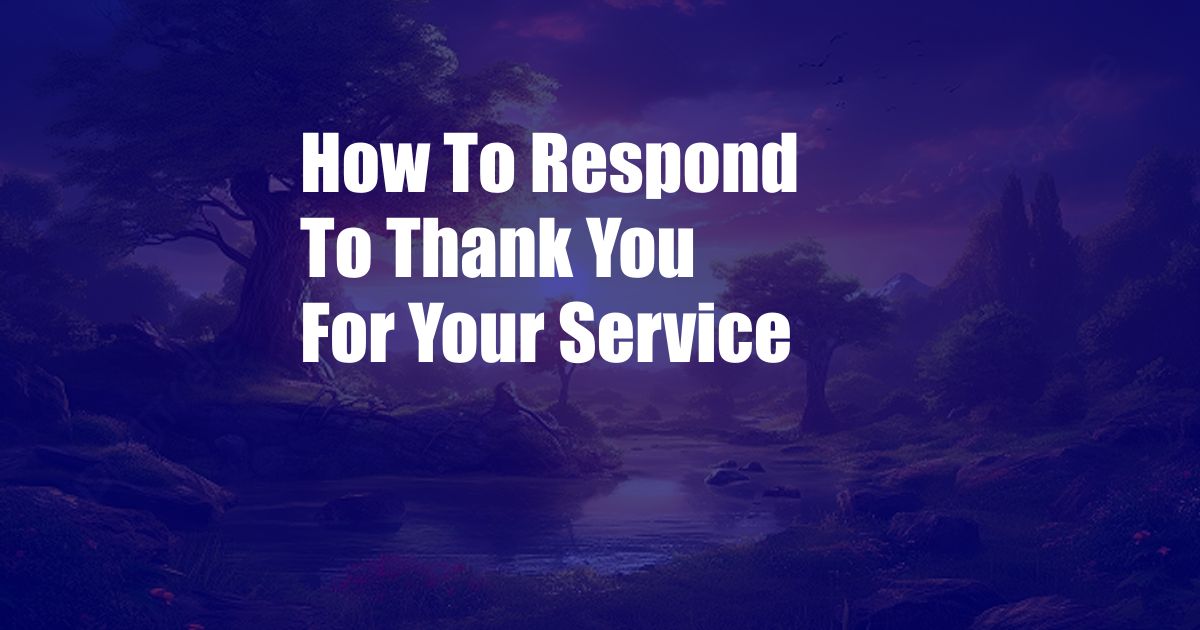
**Honoring the Gratitude: A Guide to Responding to “Thank You for Your Service”**
In the heart of every American beats a rhythm of gratitude for those who have served our nation. Whether it is a heartfelt handshake or a quiet nod, acknowledging their sacrifice is a gesture that carries profound significance.
As veterans and members of the military, you have undoubtedly encountered these words: “Thank you for your service.” While these sentiments fill us with pride, finding the right words to respond can be equally meaningful. Let us explore the nuances of this expression and provide you with a comprehensive guide to responding with honor and appreciation.
**Expressing Appreciation and Humility:**
Begin by acknowledging the person’s gratitude. Use phrases such as “Thank you for your kind words” or “I appreciate your support.” Avoid dismissing or downplaying their appreciation. Instead, show them that you value their acknowledgment.
Next, express humility by recognizing that you are not alone in your service. Remind them that countless service members have contributed to the nation’s well-being. You can say, “It was an honor to serve alongside so many dedicated individuals” or “We are all part of a greater cause.” This acknowledgment shares the credit and highlights the collective nature of military service.
**Providing Context and Sharing Experience:**
If you feel comfortable, share a brief anecdote or experience that encapsulates the spirit of your service. This allows the person to better understand the sacrifices you and your fellow service members have made. You can say, “During my deployment to Afghanistan, our unit worked tirelessly to protect our country and support the local population.” By sharing your story, you help them appreciate the tangible impact of military service.
However, be mindful of sharing sensitive or graphic details. Your response should be respectful and avoid glorifying war. The goal is to convey your appreciation while also providing a glimpse into the complexities of military life.
**Staying True to Your Service:**
Even if you disagree with the decisions made by policymakers or the conduct of certain military operations, it is important to avoid expressing negative opinions when responding to “Thank you for your service.” Instead, focus on the positive aspects of your service and the values that motivated you.
For example, you can say, “I am grateful for the opportunity to have served my country and contribute to its defense.” This response acknowledges the gratitude while maintaining a professional and non-partisan stance.
**Connecting on a Personal Level:**
Use the interaction to build a connection beyond military service. Ask the person about themselves and show interest in their life. This demonstrates that while you value your service, you recognize their individuality and humanity.
You can say, “It’s always a pleasure to meet a fellow supporter of the military. What brought you here today?” This simple question opens up a dialogue and allows you to establish a meaningful connection.
**FAQs on Responding to “Thank You for Your Service”:**
Q: Is it necessary to respond to someone thanking me for my service?
A: While not required, it is a respectful gesture to acknowledge their gratitude. Even a brief response can make a positive impact.
Q: What should I say if I am not comfortable sharing my experiences?
A: You can offer a simple and sincere “Thank you” or express appreciation for their support without going into detail about your service.
Q: Is it acceptable to decline a “thank you” if I have a negative view of my military experience?
A: While you are entitled to your own experiences, it is generally not considered appropriate to decline a “thank you” from someone who has shown their appreciation. Focus on the positive aspects of your service that you can share.
**Conclusion:**
Honoring those who serve is a gesture that transcends words. Responding to “Thank you for your service” with gratitude, humility, and a willingness to connect on a personal level is a powerful way to show your appreciation and remind others of the sacrifices made by our military. Remember, this is an opportunity to not only acknowledge your service but also to bridge the gap between civilians and veterans, fostering greater understanding and mutual respect. Are you interested in learning more about the topic of responding to “Thank you for your service”?